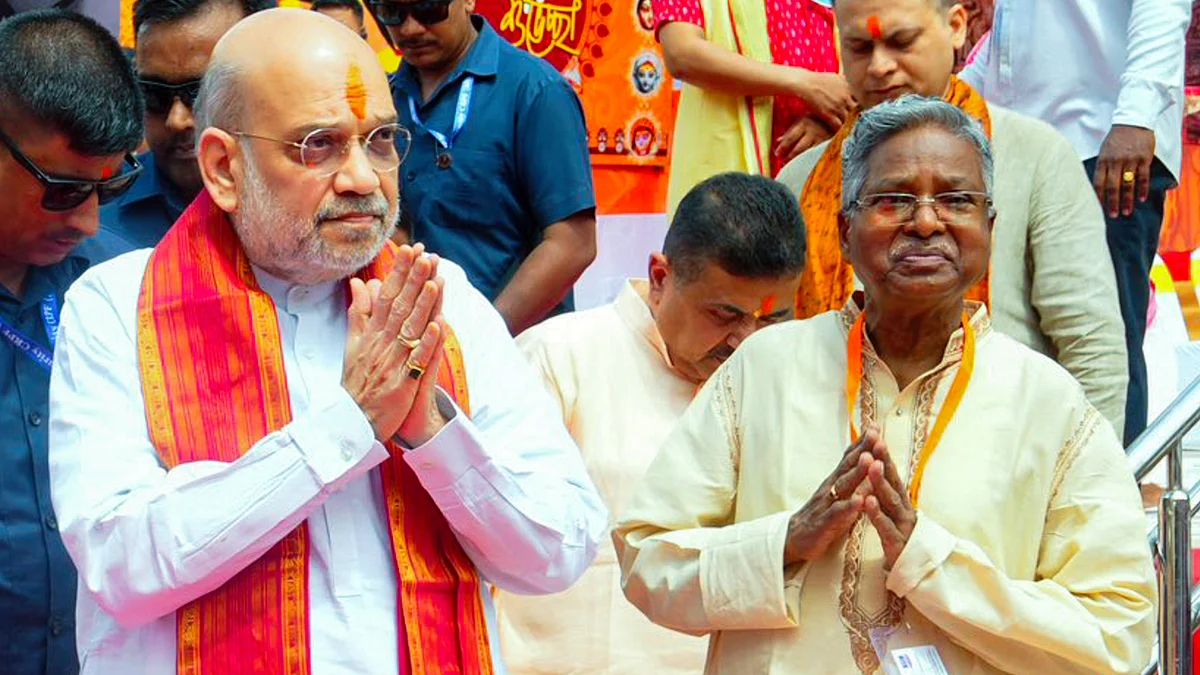TMC's Abhishek takes on Shah as Cal HC strikes down deportation of Bengalis to B'desh
Detention and deportation order was passed by FRRO in Delhi against six Bengali-speaking individuals, including a pregnant woman

In a judgment that could have far-reaching political implications, the Calcutta High Court on Friday struck down a detention and deportation order passed by the Foreigners Regional Registration Office (FRRO) in Delhi against six Bengali-speaking individuals, including a pregnant woman from West Bengal's Birbhum district.
The court directed the Central government to ensure their immediate repatriation, giving the families, branded “Bangladeshi migrants” by officials, a reprieve after months of uncertainty.
The high court declared the deportation order unlawful and instructed that the families be brought back without delay. It also dismissed the Centre’s plea for a temporary stay, ordering that Sonali Bibi, Sweety Bibi and four other members of the family, including three children, return to India within a month.
The judgment comes against the backdrop of long-standing allegations that Central agencies have unfairly targeted Bengali Muslims, labelling them as 'Bangladeshis' without due process. For Bengal's ruling Trinamool Congress (TMC), the decision was vindication.
TMC national general-secretary Abhishek Banerjee seized on the development, calling it proof of what he described as a “cruel and systematic campaign of harassment aimed at Bengalis”. In a post on X, he declared: “This judgement lays bare a CRUEL and SYSTEMATIC campaign of harassment aimed at Bengalis by the Bangla-Birodhi Zamindars. We will hold the ones responsible to account, in courts, in public debate and at the polls. The people of Bengal will not tolerate XENOPHOBIA, HUMILIATION, or the POLITICS OF EXCLUSION.”
Later in the day, speaking at Vidyasagar College in Kolkata, Banerjee tied the ruling directly to the political rhetoric of Union home minister Amit Shah, who was on a two-day visit to the city. Shah had earlier prayed before goddess Durga for a change of guard in Bengal in the 2026 Assembly elections, promising to deliver a “sonar (golden) Bangla” in line with Rabindranath Tagore’s vision.
“I have prayed to Ma Durga that after this election, a government should be formed that can build a Sonar Bangla. Our Bengal should once again become safe, prosperous, peaceful and abundant,” Shah said while inaugurating the Santosh Mitra Square Durga Puja pandal.
Banerjee responded with a blistering retort, dismissing the BJP’s promises as hollow. “They talk of Sonar Bangla, but did they make Sonar Bihar? Were they able to make Sonar Gujarat, Maharashtra or UP? They are using our funds in all these BJP-ruled states,” he said, accusing the Centre of withholding Rs 2 lakh crore owed to Bengal.
He also mocked Shah’s gestures of homage to Bengal’s icons, pointing to the vandalism of Ishwar Chandra Vidyasagar’s statue during a 2019 BJP rally in Kolkata. “The broken statue is still kept inside. He should have paid his respects here. This is why we call them Bangla-Birodhi,” Banerjee quipped.
Crucially, he linked the high court’s deportation ruling to what he called the BJP’s politics of exclusion.
“On Vidyasagar’s birth anniversary, along with the slap that the high court has delivered today, they must apologise first to the people of Bengal,” he said, adding that the judgment had exposed the dangers of a policy that conflates Bengali Muslims with illegal migrants.
The clash encapsulated two competing narratives. Shah sought to pitch the BJP as the party that would restore Bengal’s lost glory, invoking Tagore and Vidyasagar as cultural anchors. Banerjee, in turn, positioned the TMC as the defender of Bengal’s dignity, language, and rights against what he described as the Centre’s xenophobic impulses.
For the TMC, the high court’s intervention was not only a legal victory but also a symbolic one, allowing it to accuse the BJP of targeting Bengalis under the guise of national security. For the BJP, Shah’s visit was meant to be a soft-power outreach through Durga Puja pandals and cultural references. But the day’s headlines were dominated by a court order that cut to the heart of one of the most sensitive issues in Bengal politics: who gets to be recognised as belonging.
With months to go before the 2026 Assembly elections, the confrontation underscores how the politics of identity and belonging will be as central as debates on development or governance. For now, the Calcutta High Court has ensured the return of six deported individuals. Whether that judgment will resonate as a broader political “repatriation” for Bengali pride is a question that will play out in the streets, courts, and ballot boxes of West Bengal.
With PTI inputs
Follow us on: Facebook, Twitter, Google News, Instagram
Join our official telegram channel (@nationalherald) and stay updated with the latest headlines
